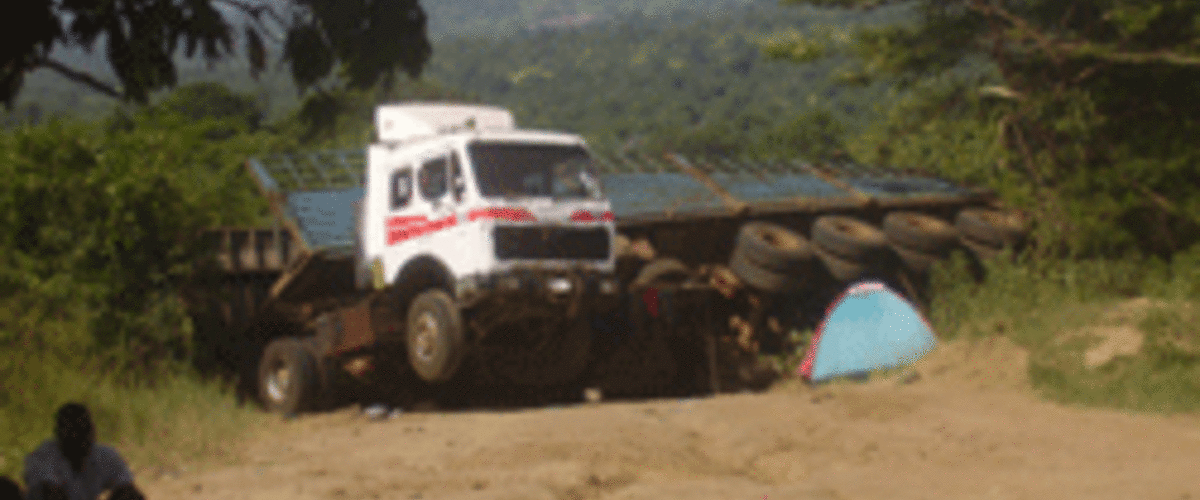The Accidental Traveller
Standing at the side of one of the main roads leading to Juba, Haruna Apiligga gazed with dismay at the smashed beer crates, scattered water bottles and torn boxes of maize flour that had tumbled out of his overturned truck.
Standing at the side of one of the main roads leading to Juba, Haruna Apiligga gazed with dismay at the smashed beer crates, scattered water bottles and torn boxes of maize flour that had tumbled out of his overturned truck.
Haruna was mainly concerned about his most valuable cargo, a hundred crates of Ugandan beer, which were now 75 per cent damaged. "This is a big loss ... I am not sure if I will recover financially," he said.
Like countless other drivers that had navigated the narrow, winding route, Haruna skidded on a bend trying to dodge a huge pothole.
The many heavy vehicles entering Southern Sudan daily have taken their toll on its unpaved roads, causing large sections to cave in and riddling them with potholes.
Only two major routes connect Juba with the rest of the region. They are especially vulnerable after heavy rains, when they become slippery and speeding drivers are unable to control their brakes.
Some accident victims remain at the roadside for agonizingly long periods of time. One passenger said his group had been stranded for seven days awaiting the vehicle's owner, who had traveled to Kampala for another car.
"Our food is finished and there is no clean water nearby ... neither is there hope for his arrival today," said the frustrated traveler. "Mosquitoes have taken pints of free blood from us ... next we will get malaria."
Accidents also inconvenience other drivers when they block the road, causing long
queues of vehicles to form. Helpless drivers endure an unexpected halt in their ill-fated
journey until another temporary route is created adjacent to the main road and they can move on.
Travelers also endure occasional attacks by unidentified gunmen, who loot their goods and cash. Some victims report that the attackers are from the Lord's Resistance Army (LRA) of Uganda, while others allege they may be Sudanese using the LRA as a scapegoat.
Accidents and other delays have increased traveling time in the region by several days, pushing up prices of essential commodities in southern towns. Until roads are upgraded or Southern Sudan becomes less dependent on Uganda and Kenya for agricultural goods, residents will continue to suffer exorbitant prices.
One truck driver standing near his capsized, heavily loaded vehicle vented his wrath on the government. "They put heavy taxes on us and yet nothing goes to road maintenance. Look at the bridges all the way from Kaya to Yei and Juba ... can't the government build larger ones?"
Development of infrastructure in Southern Sudan has been delayed due to a series of civil wars dating back to 1955. Although several peace agreements have been signed, they were too short-lived to allow time for any serious roadwork.
After the signing of the Comprehensive Peace Agreement (CPA) in 2005, the Government of Southern Sudan (GoSS) became responsible for development in the region, with a helping hand from the Khartoum-based Government of National Unity and UN agencies. Roads are now one of the GoSS' biggest challenges.
The angry truck driver will be heartened to learn that the GoSS launched a 20-month project to repair the Juba-Nimule road in April and that it has also begun work on bridges. Juba-Rokon-Mundri road is under construction by the World Food Programme, while the UN Office for Project Services is working on the Yambio-Tambura road.
Hopefully, being stranded on a Southern Sudanese road for seven days with little food will soon become an unpleasant memory of the past.
 UN
UN United Nations Peacekeeping
United Nations Peacekeeping





